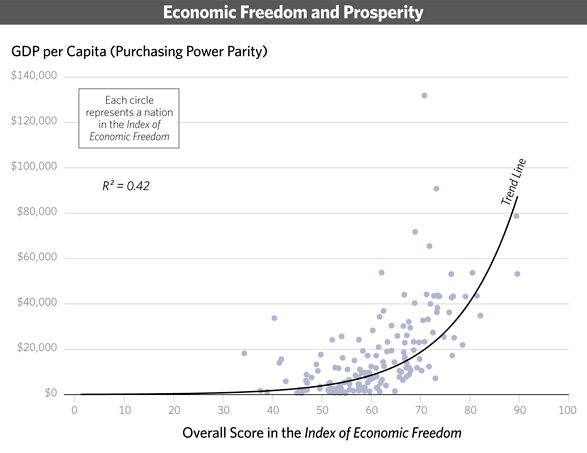The Dearth of the Unimproved World
Civilization--mankind’s escape from the crushing poverty of the state of nature--depends on economic freedom and the institutions that support it.
I am no Hobbesian, but Hobbes was certainly correct that in our natural state, the life of man is solitary, poor, nasty, brutish, and short. The dearth of the unimproved world might be the greatest natural fact about human life. But it has less to do with the state of war, as Hobbes feared, and much more to do with the simple consequences of not producing enough.
I call this dearth "natural" because nobody created it. Nobody needed to. Dearth is simply what happens when nobody has yet created enough of everything good. Or when good things, particularly consumer goods, are destroyed faster than they can be replaced. (Either one will do, as Venezuela is lately discovering.)
Rousseau, I am afraid, was dead wrong: The state of nature is a state of wretched misery that is is so awful that it's almost impossible for us to understand. (Modern variants on Rousseauism don't help. A country that is only rich in pristine natural resources will not be rich at all.) Exiting our natural dearth takes work: Work to figure out what people value, and work to supply it efficiently. Doing this work is one of the key reasons we humans choose to live together in the first place. We do this thing called civilization – which otherwise might be quite a risk, and quite a bother – in part so that we can specialize, trade, realize gains from trade, and leave behind our natural misery. That's exactly how it's done, and there are no other ways that we know of.
Civilization requires good behavior, and our institutions matter enormously for this project. Institutions that permit specialization, trade, and relatively flexible, decentralized responses to changing circumstances will produce plenty. Institutions that discourage specialization and trade, and that prevent innovation, will lead us back to nature, and to dearth.
Even modest commitments to market institutions can yield big dividends, as China has lately discovered. And at the top end of the economic freedom graph... well... to be honest, we're not exactly sure yet. As economic freedom rises, so does per capita GDP, but the relationship doesn't seem to top out at any level of economic freedom that we've observed in the real world . For all we know, it would appear to just keep getting better.
This isn't just the stuff of libertarian theory (or of libertarian fantasy, if you're a lefty). At the far upper end of the scale, institutional features like transferable private property, sound contract law, freedom from government corruption, and the freedom to start a business would appear to produce more, and more, and more. These core institutions still realize high levels of per capita GDP, even while also supporting sizable welfare states:

I find that modern liberals tend to deny or discount these facts. A modern liberal is someone who can look at the above graph and say, “it's time to stop exactly here.” Or worse: “It's time to take some of these freedoms away.” And yet much of what modern liberals claim to want – like the welfare state – can hardly be budgeted without the economic base of a free market to support it.
Wealth needs constant replenishing, not merely preservation or distribution, and the optimal ways of replenishing it are always shifting. The entrepreneur's work is never done. It's not merely a matter of consumer taste, either, or of simply replicating the very same act of putting a meal on the table, time and again. As to raw materials and production methods, there will always be a question of how best to economize, and the answer to that question will always be in the process of changing.
As a result, the state of dearth is never terribly far away. It's not a relic from the distant past. It's not reserved for people who live in far-off places under governments different from our own. Wherever we are, the dearth of the unimproved world is just a few bad institutional choices away. Institutional choices that, say, make buying and selling more difficult, or that scare off trade, or that rob wages and savings of their value.
My sense is that these things should bother the left a great deal more than they do. Many progressive policy goals, including the welfare state, are difficult to obtain at all, if leftist institutions and ideological commitments are thoroughly implemented. Some parts of modern progressivism can perhaps only be had at the expense of other parts.
As for me, I sometimes imagine being asked to recruit a team of people who would together try to exit from the state of dearth. The very first people whom I would want on my team would not be the ones with the finest sentiments about how pies should be divided. To the exclusion of all others, I would want people who could actually make pies, whether individually, or as a team, or even in peaceful, businesslike competition with one another. Give me nothing but piemakers, all the way down the line. We can cut the pie up after it's made. Or maybe not, because if we chose our institutions correctly, we wouldn't need pie knives. We'd need bulldozers.
Ah yes: Institutions. If I had to pick people of some secondary occupation, I might pick a small number of carefully selected individuals who spent all their time making sure that the piemakers were left perfectly undisturbed as they worked. But that is both a difficult occupation to perform, and the subject of many future columns.